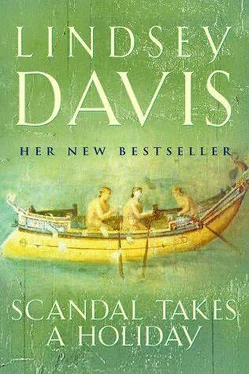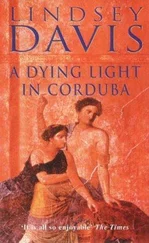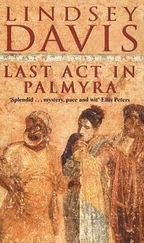Lindsey Davis - Scandal Takes a Holiday
Здесь есть возможность читать онлайн «Lindsey Davis - Scandal Takes a Holiday» весь текст электронной книги совершенно бесплатно (целиком полную версию без сокращений). В некоторых случаях можно слушать аудио, скачать через торрент в формате fb2 и присутствует краткое содержание. Жанр: Исторический детектив, на английском языке. Описание произведения, (предисловие) а так же отзывы посетителей доступны на портале библиотеки ЛибКат.
- Название:Scandal Takes a Holiday
- Автор:
- Жанр:
- Год:неизвестен
- ISBN:нет данных
- Рейтинг книги:4 / 5. Голосов: 1
-
Избранное:Добавить в избранное
- Отзывы:
-
Ваша оценка:
- 80
- 1
- 2
- 3
- 4
- 5
Scandal Takes a Holiday: краткое содержание, описание и аннотация
Предлагаем к чтению аннотацию, описание, краткое содержание или предисловие (зависит от того, что написал сам автор книги «Scandal Takes a Holiday»). Если вы не нашли необходимую информацию о книге — напишите в комментариях, мы постараемся отыскать её.
Scandal Takes a Holiday — читать онлайн бесплатно полную книгу (весь текст) целиком
Ниже представлен текст книги, разбитый по страницам. Система сохранения места последней прочитанной страницы, позволяет с удобством читать онлайн бесплатно книгу «Scandal Takes a Holiday», без необходимости каждый раз заново искать на чём Вы остановились. Поставьте закладку, и сможете в любой момент перейти на страницу, на которой закончили чтение.
Интервал:
Закладка:
I sat down, nodding sympathetically. Helena went back to chopping. For a girl who had been brought up to consider kitchens as places into which she was only expected to wander to give orders about recipes for patrician banquets, she could now wield sharp knives adeptly. I identified a handy cloth that would stanch blood, then I watched with caution. I had taught her to try and avoid chopping off her fingers, but it seemed best not to distract her until she finished. Helena had long, beautiful hands.
After a time she threw the leeks in a bowl of water, rattled them about to clean them, wiped the knife, banged down a pan on the cooking bench I had improvised, looked for the olive oil distractedly, and allowed me to find it for her. I took hold of the pan handle. She snatched it away from me. I stood aside politely. She elbowed me back into position and allowed me to take over cooking. Aulus, with unheard-of domestic sense, unwound himself and poured a beaker of red wine, which he placed formally in his sister's hand. Helena leaned against the table, sipping. Her frown relaxed. Soon she told me glumly that Petronius had called that morning; he had looked up the lists of undesirables kept by the vigiles, and found no mention of any Damagoras. Then we got to the nub.
Helena added that the reason Junia had called was to gloat that Gaius Baebius did have some information on the name. Being Junia, she would not tell Helena what. Well, that was why Helena was annoyed. I would have to see Gaius Baebius. Now I was annoyed too. Still, the leeks were good. I crumbled in some goat's cheese and de stoned black olives, frisked it all around with a little salty fish-pickle, I served it into bowls, and topped off-with a dribble of extra oil. We ate this with yesterday's bread. Helena had been too angry to go out to the baker for fresh.
XII
I took the ferry to Portus, where Gaius Baebius worked in his capacity as a customs clerk, or, as he would pedantically add, a supervisor. The vital labour of harassing importers for their tax took place at the main harbour, the big new one planned out by the Emperor Claudius and finished by Nero. Meant to replace the clogged facilities at Ostia, Portus had been inadequate for the task since the day it was inaugurated. I knew Gaius would explain that to me all over again, whether or not it affected my enquiry and despite me reminding him that he had moaned on about it before. I had promised Helena I would use the ferry trip to calm down.
Instead, as I sat in the boat being rowed slowly over, stress gripped me. Portus Augusti had been constructed about two miles to the north of Ostia itself.
I tried to concentrate on geography. Ostia was the only real harbour on Italy's western coast for many miles in both directions, or nobody would ever have made land here. You probably had to go up as far as Cosa to find a decent berth to the north while to the south, grain ships which came from Africa and Sicily still often unloaded at Puteoli on the Bay of Neapolis, after which the corn was transported overland to avoid the difficulties here. Nero had even wanted to build a canal all the way from Puteoli, as a' simpler' solution than trying to improve the Ostia maritime gateway. Rome had been founded upstream on high ground at the earliest bridgeable point on the Tiber, but that presupposed ours was a useful river. Romulus was a shepherd. How would he know? Compared with the grandiose waterways in most major provincial capitals, old Father Tiber was a widdle of rat's piss. Even at Ostia, the muddy river mouth was not much more than a hundred strides across; Helena and I had been given much amusement the other morning, watching large ships trying to manoeuvre past each other amidst shouts of alarm and clashing oars.
And the river was unfriendly. Swimmers were regularly plucked out of their depth and swirled to their death by drowning. Children did not paddle on the Tiber's brim. The small, meandering Tiber was too full of silt, its current was unpredictable, and it wound all over the countryside.
That said, although it flooded often and suffered droughts, it was rarely impassable. Vessels could make their way inland to moor right up alongside the Emporium in Rome, and some still did.
However, rowing upstream meant the fast flow was against them. Sailing was ruled out because of the bends; square-rigged ships lost the wind at every turn. So they were towed. Some were hauled by draught animals, but most were dragged up or down the twenty-mile distance by teams of despondent slaves. That imposed a weight limit. And it was why Ostia, together now with Portus, was so important. Many ships had to moor and unload when they arrived at the coast; then they had to lay up, while they awaited their out-going loads and passengers.
So Ostia had always served as a docking anteroom to Rome. Unhappily, it had been chosen and founded by saltpan workers, not sailors. The Tiber mouth was perfect for an industry that required shallows, but there had never been deep moorings. Worse, it was an unsafe landing point. The largest trade vessels, including the huge imperial corn transporters had to disembark at least part of their cargoes into tenders out in the open sea. That was dangerous, and only feasible in summer. Two currents met, where the river dashed out into the oncoming tide. There were treacherous west winds to contend with. Add in the coastal shoals and the sand bar at the mouth of the river, and merchantmen arriving from foreign lands had a good chance of foundering.
Meanwhile, for more manageable shipping that ventured straight to land there were still problems. As it finally reached the coast, the Tiber divided into two channels, both nowadays too choked with silt for ships of any size. Portus had been designed to relieve the problem, and to some extent it did. Many trading vessels now docked in the Portus basin. The muddy Tiber channels were still busy with traffic, especially the four different ferry services, all run by dour, toothless men whose families predated Romulus, who charged separate fares for locals and for visitors, and who could diddle your change in all known foreign currencies. I braved the ferry, then hitched a lift in a vegetable cart across the Island, a flat area of market gardens with rich soil through which a busy road now ran. I had been here several times over the years, usually making Portus my starting point for overseas missions.
Each time I had found more and more building work, as thewarehouses expanded and people chose to build new homes out here where they worked.
The new harbour was heavy-duty imperial magnificence. Encircling walls surrounded the great basin, forming two moles which thrust out to sea. On their far ends stood temples and statues, and between them lay a man-made island. This was famously formed by the sunken ship that had once brought from Egypt that enormous obelisk which now graced the central divide of Nero's Circus in Rome.
The delivery ship had been scuppered in deep water, while laden with ballast, and on to this base was planted a four-storey lighthouse, topped by a colossal statue of a monumental nude; to me it looked like an emperor, only lightly draped for modesty. Below him, shipping sailed in through the north passage and out through the south, with sailors and passengers staring up at the imperial never-you minds and thinking ooh, what a dramatic sight. The giant Julio-Claudian goolies were even more dramatic when under-lit by the pharos at night. The harbour itself was crammed with every kind of vessel, right down to summer visitors from the Misenum Fleet. On a famous occasion, the flagship had called in, the gaudy hexeris called the Ops.
Today I saw a line of three deserted triremes which were clearly military, in among the oceangoing traders. Tugs, each with sets of chubby oars and a sturdy towing mast, slowly shunted around large vessels as moorings needed to be rearranged. Bumboats skidded over the water like fleas, amidst shouts of abuse or greeting. Skiffs pottered aimlessly in the hands of those inevitable old harbour bores who hang about wearing seafaring caps and trying to cadge drinks off people like me. From time to time large vessels silently entered or left the harbour beneath the shadow of the lighthouse, then there would be flurries of interest among the cranes and offices on the moles.
Читать дальшеИнтервал:
Закладка:
Похожие книги на «Scandal Takes a Holiday»
Представляем Вашему вниманию похожие книги на «Scandal Takes a Holiday» списком для выбора. Мы отобрали схожую по названию и смыслу литературу в надежде предоставить читателям больше вариантов отыскать новые, интересные, ещё непрочитанные произведения.
Обсуждение, отзывы о книге «Scandal Takes a Holiday» и просто собственные мнения читателей. Оставьте ваши комментарии, напишите, что Вы думаете о произведении, его смысле или главных героях. Укажите что конкретно понравилось, а что нет, и почему Вы так считаете.












